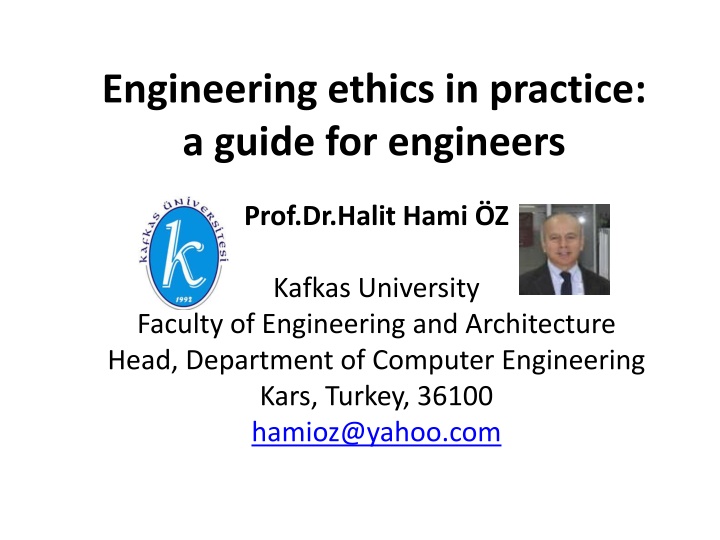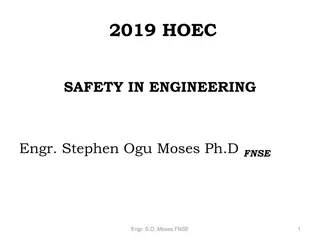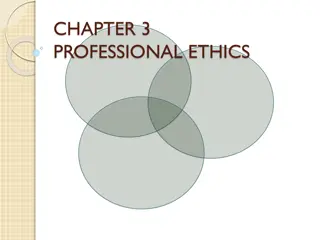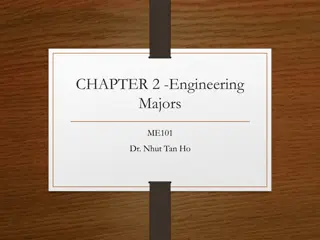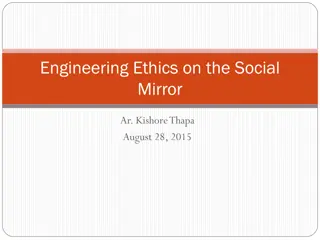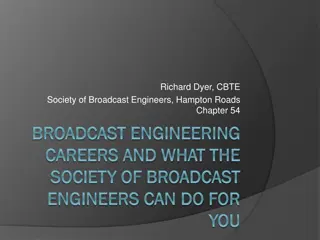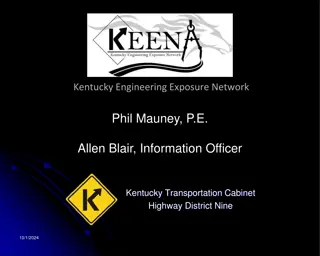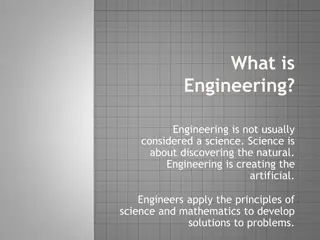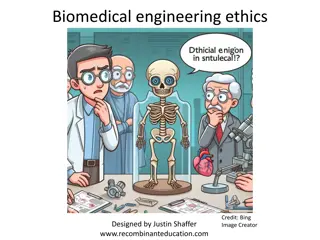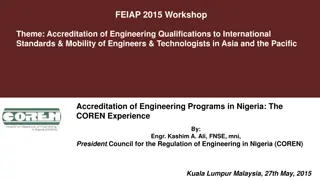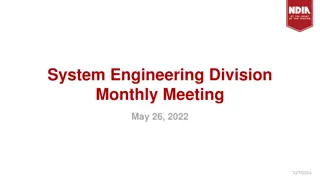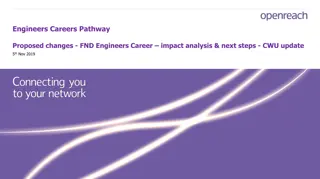Engineering Ethics in Practice: A Guide for Engineers by Prof. Dr. Halit Hami Z. - Insights and Reflections
The book "Engineering Ethics in Practice: A Guide for Engineers" by Prof. Dr. Halit Hami Z. from Kafkas University provides insights on a range of ethical issues faced by engineers. Through case studies, it highlights the importance of addressing ethics in engineering work and offers guidance on navigating ethical dilemmas. The conclusion section emphasizes the application of these insights to everyday ethical challenges in engineering practice. Prof. Dr. Halit Hami Z.'s course on Engineering Ethics further encourages reflection on personal ethical considerations and promotes ethical decision-making in the engineering profession.
Download Presentation

Please find below an Image/Link to download the presentation.
The content on the website is provided AS IS for your information and personal use only. It may not be sold, licensed, or shared on other websites without obtaining consent from the author.If you encounter any issues during the download, it is possible that the publisher has removed the file from their server.
You are allowed to download the files provided on this website for personal or commercial use, subject to the condition that they are used lawfully. All files are the property of their respective owners.
The content on the website is provided AS IS for your information and personal use only. It may not be sold, licensed, or shared on other websites without obtaining consent from the author.
E N D
Presentation Transcript
Engineering ethics in practice: a guide for engineers Prof.Dr.Halit Hami Z Kafkas University Faculty of Engineering and Architecture Head, Department of Computer Engineering Kars, Turkey, 36100 hamioz@yahoo.com
I used the Engineering ethics in practice: a guide for engineers book written by The Royal Academy of Engineering for teaching as well as making the ppt presentations about the Engineering Ethics course Prof.Dr.Halit Hami Z Prof.Dr.Halit Hami OZ - Engineering Ethics Course 2
6. Conclusion One of the intentions of this guide was to give some impression of the range and complexity of ethical issues faced by engineers. The eighteen cases in the full version of this guide attempt to reflect this range of issues, though there are countless other cases that could have been used, from all areas of engineering work. Another intention was to demonstrate the need for engineers to engage with ethical issues in their work, and to show that that by untangling these issues it is possible to see clear paths ahead, and not just a thicket of conflicting opinions. This brief concluding section will suggest some general ways in which to take an interest in ethics further. Prof.Dr.Halit Hami OZ - Engineering Ethics Course 3
6. Conclusion Firstly, there is a good deal of further information available relating to ethics, including more case studies, analysis of news events, and other resources connected to ethics in the engineering profession. The following resources section points to sources of such information. Prof.Dr.Halit Hami OZ - Engineering Ethics Course 4
6. Conclusion Secondly, the insights from the cases in this guide can be applied to ethical issues faced in everyday practice. The following questions might help in applying the cases: Having thought about some ethical issues in engineering, can you now identify any issues from your own work of which you were previously unaware? Are any of the cases in the guide closely related to issues you or your colleagues have faced or are facing? If so, what were the important similarities and differences between your case and the case in this guide? Has the way the case was discussed in the guide changed the way you thought about your own case? Would you act differently, or do you feel you should have acted differently, in the light of the considerations outlined here? Prof.Dr.Halit Hami OZ - Engineering Ethics Course 5
6. Conclusion Closely related to this last point, it is important to engage with the way that ethical questions are tackled at organisational as well as individual levels. One way of doing this would be to seek out and reflect upon material such as company codes of conduct and guides to ethics. As well as these explicit statements of ethical commitments, it is also important to reflect upon implicit ethical guidance what kinds of behaviours are rewarded and praised by employers? What kinds are censured? In taking a reflective view of how an organisation approaches and deals with ethical issues it will be interesting, and important, to determine the extent to which explicit and implicit forms of guidance cohere or conflict with each other. Prof.Dr.Halit Hami OZ - Engineering Ethics Course 6
6. Conclusion Engineering is a broad discipline and the case studies here cannot encompass all of the ethical issues that an engineer might face. However, ethical dilemmas quite different from those included in this guide can benefit from being approached in a similar way. This involves asking the following questions regarding as situation: Prof.Dr.Halit Hami OZ - Engineering Ethics Course 7
6. Conclusion What are the empirical facts relating to the case? What are the ethical values? How do these depend on and inform each other? How can the reasons for taking a particular course of action be articulated and defended? Is the proposed course consistent with the Statement of Ethical Principles, and with the values, principles or rules of conduct of the relevant professional organisation or company? Prof.Dr.Halit Hami OZ - Engineering Ethics Course 8
6. Conclusion Finally, engineers are invited to take a more active role in the ethical life of the profession. Traditionally, there has not been a clear demand for engineers to take a view on the ethical issues affecting their profession. In this respect, engineering is different from, for example, medicine. It would perhaps be surprising for a doctor not to have at least thought about the ethical issues surrounding, say, abortion, or euthanasia. Yet, as we have seen, the ethical issues in engineering are just as real, and they too can have very grave consequences. Moreover, it is no more possible for engineers to avoid ethical issues than it is for doctors to do so. Prof.Dr.Halit Hami OZ - Engineering Ethics Course 9
6. Conclusion A good place to start engaging with professional ethics is through professional bodies. Some of these run training events or workshops in professional ethics, or provide web forums or other means of communicating with other members about these issues. The Royal Academy of Engineering has a series of publications on engineering ethics issues, links to which can be found in the resources section at the end of this guide. Individual professional bodies can be encouraged to communicate the importance of ethics, and this can be stimulated by groups of engineers organising themselves to discuss ethical issues. Prof.Dr.Halit Hami OZ - Engineering Ethics Course 10
6. Conclusion Regarding specific ethical issues, some engineers are concerned that decisions are increasingly taken out of the hands of engineers. One concern that people have about rail safety, for example, is that it seems to be the case that fewer engineers are being employed at the higher levels of management resulting in important decisions being made without appropriate input from engineers. If this concern is right, this is a trend that engineers should be active in trying to reverse. Prof.Dr.Halit Hami OZ - Engineering Ethics Course 11
6. Conclusion concern that they are often put under pressure to agree with the decisions that the managers want to make. The Challenger disaster is typically cited as an example of where this sort of pressure affected the decision of the engineers. In these cases, it can be very difficult for engineers to stick to what they consider to be the right decision. Likewise, where engineers are aware of unsafe or illegal practices, and feel that they ought to blow the whistle, it may still be very difficult for them to actually do what they feel they ought to because they may (legitimately, given past history) worry about the effect that being a whistleblower will have on their career. Prof.Dr.Halit Hami OZ - Engineering Ethics Course 12
6. Conclusion However, industries are increasingly using confidential reporting techniques as a way of allowing engineers to report problems and enabling lessons learned by others to be passed on. Such systems are used in medicine, aviation, and structural engineering. These systems could be used across the engineering profession, and individual engineers will have a significant role in encouraging professional bodies to put them in place. Prof.Dr.Halit Hami OZ - Engineering Ethics Course 13
6. Conclusion Ethics is not a set of rules that can be learned and taken for granted. Nor is it a simple framework that can be applied to problems to make them disappear. Engaging with ethical questions is a difficult ongoing process that requires awareness, reasoning skills, imagination, and the ability to scrutinise and evaluate your opinions as well as those of others. In short, it is a set of skills, abilities and character traits that can only be developed with practice. This development is not only necessary, however; it is rewarding, enlightening and confidence-building. We hope that this guide will inspire engineers to take this approach in their working lives. Prof.Dr.Halit Hami OZ - Engineering Ethics Course 14
7. Resources In this section we have suggested some resources that can help you further develop an interest in engineering ethics. This list is not exhaustive; there are likely to be many more resources than those of which we are aware. However, this is hopefully enough to get you started, and covers a reasonably wide range of subjects in engineering ethics, professional ethics, and ethics in general. Prof.Dr.Halit Hami OZ - Engineering Ethics Course 15
7. Resources The Royal Academy of Engineering and the Engineering Council The Academy and the Engineering Council jointly produced their Statement of Ethical Principles (http://www.raeng.org.uk/societygov/engineeringethic s/principles.htm) in October 2005, and revised and updated it in June 2007. This guide is based on the principles in that statement. More information on the Academy s activities with regard to engineering ethics and practice and teaching engineering ethics can be found on their website. Prof.Dr.Halit Hami OZ - Engineering Ethics Course 16
7. Resources The Academy also produces events and publications related to engineering ethics. These include a discussion document on the social, legal and ethical issues surrounding the development and use of autonomous systems, and some tips for teaching engineering ethics, as well as reports from a workshop on engineering ethics and accreditation, a conference on engineering ethics and practice and an earlier engineering ethics conference. Prof.Dr.Halit Hami OZ - Engineering Ethics Course 17
7. Resources The Engineering Council provides guidelines for institutions codes of conduct, and maintains the UK Standard for Professional Engineering Competence (UK-SPEC), which sets standards for levels of professional registration for engineers, including ethical and professional standards. Prof.Dr.Halit Hami OZ - Engineering Ethics Course 18
Professional engineering bodies Approaches to ethics differ among the UK engineering professional bodies. The following are links to the sections of the public area of a selection of engineering institutions websites that are relevant to ethics. Often, though not always, this is a code of conduct, royal charter or set of ethical principles or values. Usually, there are several areas on the site that are worth exploring, and in some cases, some information may be restricted to members. Prof.Dr.Halit Hami OZ - Engineering Ethics Course 19
Professional engineering bodies Institute of Materials, Minerals and Mining http://www.iom3.org/content/code-conduct Institution of Chemical Engineers http://www.icheme.org/about_us/ethics.aspx Institution of Civil Engineering Surveyors http://www.cices.org/bylaw.html Institution of Engineering and Technology http://www.theiet.org/about/ethics/index.cfm Institution of Mechanical Engineers http://www.imeche.org/membership/ethics Institution of Structural Engineers http://www.istructe.org/knowledge/topic_areas/Pages/default.aspx Prof.Dr.Halit Hami OZ - Engineering Ethics Course 20
Other professional bodies The following links are to the relevant public web pages of organisations from professions outside engineering. Some of these will relate to activity that is directly relevant to the work of many engineers most obviously those that discuss ethics in the conduct of business activity. Others will not be directly relevant, but instead provide an interesting point of contrast, illustrating the extent to which common ethical considerations apply across various professional activities. Prof.Dr.Halit Hami OZ - Engineering Ethics Course 21
Other professional bodies Chartered Institute of Building http://www.ciob.org.uk/about/royalcharter International Federation of Accountants http://www.ifac.org/Ethics/ British Medical Association http://www.bma.org.uk/ethics/index.jsp Faculty and Institute of Actuaries http://www.actuaries.org.uk/regulation/pages/actuaries-code The Bar Standards Board http://www.barstandardsboard.org.uk/standardsandguidance/codeofconduct/ tableofcontents/ Royal Institution of Chartered Surveyors http://www.rics.org/ethics Prof.Dr.Halit Hami OZ - Engineering Ethics Course 22
Support, advice and guidance Many professional bodies will provide support, advice and guidance for engineers facing ethical issues. Often, employing organisations, whether public or private sector, will have their own ethics guides, statements of values, or codes of conduct to help staff tackle ethical issues in their professional lives. In addition, many offer helplines which offer advice and support to staff. There are also specialist organisations that provide support and advice for some specific kinds of ethical issues that arise for engineers Prof.Dr.Halit Hami OZ - Engineering Ethics Course 23
Support, advice and guidance Transparency International is an organisation that focuses on issues of corruption. The Global Infrastructure Anti-Corruption Centre (GIACC) publishes extensive free information, advice and tools on preventing corruption in the infrastructure sector. Public Concern at Work (PCAW) deals with issues of whistleblowing. You may also be able to get legal and other relevant advice from Citizens Advice. Institute of Business Ethics is an organisation promoting best ethical practice in business. Prof.Dr.Halit Hami OZ - Engineering Ethics Course 24
Academic centres Centres of expertise based at UK academic institutions. Inter-Disciplinary Ethics Applied CETL Producers of this guide. Based at the University of Leeds, the centre aims to help students and professionals to recognise, analyse and respond effectively to ethical issues as they arise. The IDEA CETL does extensive work in engineering ethics, both inside and outside HE. Prof.Dr.Halit Hami OZ - Engineering Ethics Course 25
Academic centres Engineering CETL Another Centre for Excellence in Teaching and Learning, the EngCETL seeks to impact on students and to develop and produce graduates who are employable, entrepreneurial, productive and innovative, through links with industry. It is located in the Faculty of Engineering at Loughborough University. Higher Education Academy, Engineering Subject Centre Also based at Loughborough University, the Engineering Subject Centre seeks to work in partnership with the UK engineering community to provide the best possible higher education learning experience for all students and contribute to the long term health of the engineering profession. Prof.Dr.Halit Hami OZ - Engineering Ethics Course 26
Blogs Blogs are an excellent way of keeping up-to-speed with the ethical aspects of current events. The blogs below were active at the time of publication of this guide. Engineering Ethics Blog Mixes general reflections on ethical issues in engineering with in-depth discussion of news events. Ethics in Public and Professional Life By the Inter-Disciplinary Ethics Applied CETL. Analysis of public and professional ethics issues. Crane and Matten Blog Analysis of business ethics issues and news events. Prof.Dr.Halit Hami OZ - Engineering Ethics Course 27
Journals and magazines Journals and magazines with engineering ethics content. Science and Engineering Ethics A multi-disciplinary academic journal that explores ethical issues of concern to scientists and engineers. The Engineer Engineering Magazine Professional Engineering Magazine Ingenia General engineering publications covering all aspects of engineering, including ethical aspects. (Magazines in specific engineering disciplines will also often cover the ethical aspects of engineering stories). Prof.Dr.Halit Hami OZ - Engineering Ethics Course 28
Books These are intended to be accessible to engineers with a general interest in ethics. Benn, P., Ethics (Routledge, 1998). A short, clear introduction to some central questions and ideas in ethics. Bowen, W. R., Engineering Ethics: Outline of an aspirational approach (2009, Springer-Verlag, London) Challenging analysis which takes a view of the overall ethical direction of the engineering profession rather than focusing on specific issues. Prof.Dr.Halit Hami OZ - Engineering Ethics Course 29
Books Davis, M., Thinking Like an Engineer: Studies in the ethics of a profession (1998, Oxford University Press). A good place to start if you want to explore further the ethical dimension of engineering as a profession. Davis offers an analysis of what is distinctive about the profession of engineering, drawing on real-life case studies to illustrate his points. Kitcher, P., Science, Truth and Democracy (2003, Oxford University Press). An academic study of science as it is practised, including the ethical aspects of its relation to society. Also relevant to engineers. Prof.Dr.Halit Hami OZ - Engineering Ethics Course 30
Books Martin, M. & Schinzinger, R., Ethics in Engineering, 4th edition, (2005, McGraw-Hill). A text book which is aimed at academics and professionals alike. A comprehensive and far- reaching guide to ethical issues in engineering. McCarthy, N., Engineering: A beginner s guide (2009, Oneworld Publications) An introduction to the technical, philosophical and cultural history aspects of engineering, including ethics. Prof.Dr.Halit Hami OZ - Engineering Ethics Course 31
Books Engineering Council: United Kingdom Standard for Professional Engineering Competence 2003, updated 2008 and 2010 W. Richard Bowen, Engineering Ethics, (Springer- Verlag, London, 2009), pp6-7. Davis, M., Thinking Like an Engineer: Studies in the ethics of a profession (1998, Oxford University Press) Prof.Dr.Halit Hami OZ - Engineering Ethics Course 32
Training Training courses are offered by some engineering professional bodies, see individual websites for details. The Inter-Disciplinary Ethics Applied CETL offers training courses through its programme of activities, Professional Ethics for Professional Engineers. This project was initially supported by an Ingenious grant from the Royal Academy of Engineering. Often these training courses are provided in conjunction with Professional Bodies, but the Centre also offers bespoke courses tailored to the specific needs of individual organisations. In addition, the Inter-Disciplinary Ethics Applied CETL offers an Online MA in Applied and Professional Ethics a distance learning course in applied and professional ethics appropriate for engineers as well as other professionals. Prof.Dr.Halit Hami OZ - Engineering Ethics Course 33
Appendix 1: The statement of ethical principles The Royal Academy of Engineering, in collaboration with Engineering Council (UK) and a number of the leading professional engineering institutions, has created a Statement of Ethical Principles to which it believes all professional engineers and related bodies should subscribe. Professional engineers work to enhance the welfare, health and safety of all whilst paying due regard to the environment and the sustainability of resources. They have made personal and professional commitments to enhance the wellbeing of society through the exploitation of knowledge and the management of creative teams. Prof.Dr.Halit Hami OZ - Engineering Ethics Course 34
Appendix 1: The statement of ethical principles This Statement of Ethical Principles sets a standard to which members of the engineering profession should aspire in their working habits and relationships. The Statement is fully compatible with the principles in the UK Government Chief Scientific Adviser's Universal Ethical Code for Scientists, with an emphasis on matters of particular relevance to engineers. The values on which it is based should apply in every situation in which professional engineers exercise their judgement. Prof.Dr.Halit Hami OZ - Engineering Ethics Course 35
Appendix 1: The statement of ethical principles There are four fundamental principles that should guide an engineer in achieving the high ideals of professional life. These express the beliefs and values of the profession and are amplified below. Prof.Dr.Halit Hami OZ - Engineering Ethics Course 36
Accuracy and rigour Professional engineers have a duty to ensure that they acquire and use wisely and faithfully the knowledge that is relevant to the engineering skills needed in their work in the service of others. They should: always act with care and competence perform services only in areas of current competence keep their knowledge and skills up to date and assist the development of engineering knowledge and skills in others not knowingly mislead or allow others to be misled about engineering matters present and review engineering evidence, theory and interpretation honestly, accurately and without bias identify and evaluate and, where possible, quantify risks. Prof.Dr.Halit Hami OZ - Engineering Ethics Course 37
Honesty and integrity Professional engineers should adopt the highest standards of professional conduct, openness, fairness and honesty. They should: be alert to the ways in which their work might affect others and duly respect the rights and reputations of other parties avoid deceptive acts, take steps to prevent corrupt practices or professional misconduct, and declare conflicts of interest reject bribery or improper influence act for each employer or client in a reliable and trustworthy manner. Prof.Dr.Halit Hami OZ - Engineering Ethics Course 38
Respect for life, law and the public good Professional engineers should give due weight to all relevant law, facts and published guidance, and the wider public interest. They should: ensure that all work is lawful and justified minimise and justify any adverse effect on society or on the natural environment for their own and succeeding generations take due account of the limited availability of natural and human resources hold paramount the health and safety of others act honourably, responsibly and lawfully and uphold the reputation, standing and dignity of the profession. Prof.Dr.Halit Hami OZ - Engineering Ethics Course 39
Responsible leadership: listening and informing Professional engineers should aspire to high standards of leadership in the exploitation and management of technology. They hold a privileged and trusted position in society, and are expected to demonstrate that they are seeking to serve wider society and to be sensitive to public concerns. They should: be aware of the issues that engineering and technology raise for society, and listen to the aspirations and concerns of others actively promote public awareness and understanding of the impact and benefits of engineering achievements be objective and truthful in any statement made in their professional capacity. Prof.Dr.Halit Hami OZ - Engineering Ethics Course 40
Appendix 2: A legal perspective Rules of ethics set by professional bodies are intended to guide members of the professional body as to what to do in difficult situations, particularly where there are conflicting pressures or considerations which need to be reconciled. The rules of ethics of some professional bodies are enforceable by disciplinary action by the professional body, but the principles discussed in this guide are more in the nature of precepts, providing authoritative guidance to engineers who are members of a range of professional bodies. Prof.Dr.Halit Hami OZ - Engineering Ethics Course 41
Appendix 2: A legal perspective Law is also seen as a set of rules about what people ought to do. Legal duties and ethical duties may overlap, but ethical rules do not have the force of law; that is, their breach does not give rise directly to criminal sanctions or civil liability enforceable by the courts. Prof.Dr.Halit Hami OZ - Engineering Ethics Course 42
Appendix 2: A legal perspective On the other hand, many of the situations addressed by the Ethical Principles involve concerns about risk to life or property or the environment and, in some cases concerns about confidentiality or accusations of wrongful conduct. Since the law tends to become involved if and when there is actual injury or damage to life or property or the environment, or where there is an alleged breach of confidentiality or unjustified accusation of wrongful conduct, the question may arise in legal proceedings as to the effect on legal liability of both efforts to follow the engineering ethics guidelines and of failure to do so. Prof.Dr.Halit Hami OZ - Engineering Ethics Course 43
Appendix 2: A legal perspective Following ethical guidelines can increase exposure to the risk of involvement in legal proceedings, as illustrated by the example of doctors who fear to respond to calls for medical assistance when they are not on duty because it could lead to them being sued if the treatment goes wrong. It is important to appreciate that actions taken in response to ethical guidance are likely to be judged on the basis of professional standards of due skill and care, and ethical guidance is only an element of such standards. Ethical guidance does not grant exemption from professional standards of due skill and care. Prof.Dr.Halit Hami OZ - Engineering Ethics Course 44
Appendix 2: A legal perspective Probably the most important practical point is to appreciate that if legal proceedings occur, the outcome depends primarily on evidence (for example to prove that one has exercised due skill and care, or given an adequate warning), and that the most cogent form of evidence recognised by the courts or any other tribunal is that provided by contemporaneous written records, preferably communicated at the time to those likely to be affected to allow them to challenge if they disagree. Engineers need to understand the importance of establishing such contemporaneous written records, and how best to do this. Diaries are a valuable means of providing a contemporaneous written record, but the most effective means is usually a letter. Prof.Dr.Halit Hami OZ - Engineering Ethics Course 45
Appendix 2: A legal perspective There is a maxim that an engineer needs to recognise when . If and when such a time the time has come to write a letter comes, the engineer needs to appreciate what to put in such a letter and who to send it to. Guidance on the contents of such a letter is straightforward: Be clear and complete. Strip out all excess and emotion. Recognise the purpose of the letter. Prof.Dr.Halit Hami OZ - Engineering Ethics Course 46
Appendix 2: A legal perspective The question of who to send the letter to may be more complex, since the problem may be that the person to whom the letter should be sent as a matter of protocol is perceived as a person who will not act in response to the letter. Some specific guidance on the effect of the Public Interest Disclosure Act is given below and this may be relevant. Another major legal point is that where an engineer comes under a duty to warn, the approach of the courts in recent cases has been that for the warning to be sufficient, it must be persisted with, almost to the point that if no action is taken in response to the attempt to warn, the warning was not sufficient. Prof.Dr.Halit Hami OZ - Engineering Ethics Course 47
The Public Interest Disclosure Act 1998 Situations arise where no injury to life, property or the environment has yet occurred, but an engineer, in the course of his employment, has concerns that there is a substantial risk which is not being addressed by others. Action by the engineer in making such concerns public in response to ethical guidance may upset his employer and lead to threats to his employment. Prof.Dr.Halit Hami OZ - Engineering Ethics Course 48
The Public Interest Disclosure Act 1998 The law in this area has developed in the UK with the Public Interest Disclosure Act 1998. Workers who disclose information relating to health and safety matters now have statutory protection of employment rights in defined situations under the Employment Rights Act 1996 Part IVA, as inserted by the Public Interest Disclosure Act 1998. Workers are defined to include individuals working on an agency basis as well as employees working under a contract of employment. For the protection rights to apply, the disclosure must be a qualifying disclosure as regards content, the person to whom it is made, and the motivation for making it. Prof.Dr.Halit Hami OZ - Engineering Ethics Course 49
The Public Interest Disclosure Act 1998 As regards content the information disclosed must, in the reasonable belief of the worker making the disclosure, tend to show that a person has failed, or is failing or likely to fail to comply with any legal obligation to which he is subject, or that the health or safety of any individual has been, is being or is likely to be endangered. Prof.Dr.Halit Hami OZ - Engineering Ethics Course 50
